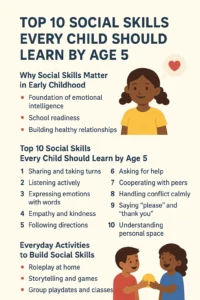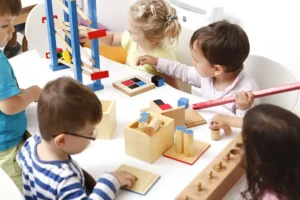Redefining Social Interaction in the Digital Era Today’s children are growing up in a world where digital screens often replace playgrounds and emojis replace expressions. While technology has its benefits, like access to learning tools, global exposure, and creative platforms, it has also quietly reduced the quality of real, face-to-face interactions. And here’s the truth: No app can replicate...
Top 10 Social Skills Every Child Should Learn by Age 5
As parents, we often focus on teaching our children how to read, write, or count. But just as important are the social skills that help them build friendships, handle emotions, and succeed in school and beyond.
Strong social skills for kids are linked to better emotional intelligence, school readiness, and overall well-being. Children who learn how to share, listen, and cooperate early in life are more confident and resilient as they grow.
So, what are the most important social skills activities for kids that you can nurture before they turn five? Let’s break them down.
Why Social Skills Matter in Early Childhood
- Foundation of emotional intelligence: Social skills teach children to identify and manage their emotions while understanding others’ feelings.
- School readiness: Classrooms thrive on cooperation, listening, and communication — skills that prepare kids to learn and work in groups.
- Building healthy relationships: Social skills strengthen bonds with family, friends, and peers, giving children a sense of belonging.
Top 10 Social Skills Every Child Should Learn by Age 5
- Sharing and Taking Turns
Learning patience and fairness through simple social skills games for kids, like board games or passing a ball. - Listening Actively
Teaching children to wait, make eye contact, and respond thoughtfully builds respect and understanding. - Expressing Emotions with Words
Instead of tantrums, encourage kids to use words like “I feel sad” or “I need help.” - Empathy and Kindness
Noticing when others are upset and offering comfort — the heart of emotional intelligence. - Following Directions
Listening to and following multi-step instructions builds focus and self-control. - Asking for Help
Kids should know that seeking help isn’t a weakness; it’s problem-solving. - Cooperating with Peers
From cleaning up toys together to building blocks in teams, cooperation strengthens teamwork. - Handling Conflict Calmly
Learning to say, “Let’s take turns” or “Can we share?” instead of pushing or grabbing. - Using Manners (Please & Thank You)
Politeness never goes out of style; simple words build respect in social interactions. - Understanding Personal Space
Children must learn when it’s okay to hug and when to give others space, a skill vital for forming friendships.
Everyday Activities to Build Social Skills
- Roleplay at Home
Pretend play (doctor, shopkeeper, or teacher) helps kids practice real-life social scenarios. - Storytelling and Games
Reading stories or playing social interaction games like “Simon Says” teaches listening and empathy. - Group Playdates and Classes
Activities such as social games for toddlers or team art projects give children practice in sharing and cooperating.

What If Your Child Is Struggling?
It’s normal for some children to develop certain social skills at a slower pace. Look for these signs:
- Trouble making or keeping friends
- Frequent tantrums during group play
- Avoiding interactions or preferring to play alone
Parents can help by:
- Encouraging play without pressuring the child
- Modeling calm conflict resolution at home
- Celebrating small social successes
If struggles continue, consulting an early childhood expert can provide reassurance and tailored strategies.

FAQs
- Why are social skills important for young children?
Social skills help kids build friendships, express emotions, and prepare for school life with confidence.
- What are the most important social skills by age 5?
Sharing, listening, empathy, cooperation, and using polite words like “please” and “thank you.”
- How can I teach social skills at home?
Through roleplay, storytelling, and simple social skills games for kids, like turn-taking activities.
- What if my child struggles with social interaction?
Encourage gently, model good behavior, and create small opportunities for group play.
- When should I worry about social skill delays?
If your child avoids interaction, has frequent tantrums, or struggles to follow directions, consult a pediatrician or child expert.
- Do social skills improve school readiness?
Yes, children with strong social skills adapt better to classrooms, teamwork, and learning environments.
Conclusion
Social skills are not just about good manners; they are the foundation of confidence, emotional strength, and school success. By age 5, every child can learn the basics of sharing, listening, and cooperating through everyday routines and social skills games.
With patience, love, and fun activities, you’re not only teaching your child how to get along, you’re giving them tools for a happy and successful future.

